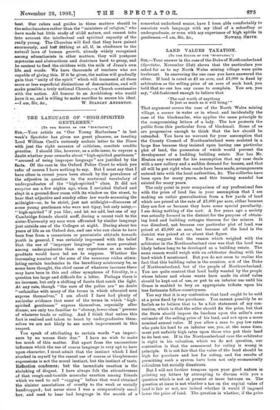THE LANGUAGE OF- "HIGH-SPIRITED GENTLEMEN."
•• [To Tux auricle OF TRIO SP NeVIITOR."1 EIR,—Your article on "Our Young Barbarians" in last week's Spectator has given me great pleasure, as treating Lord William CeciVs curiously archaic letter to the Times with just the right measure of criticism, comitate condita gravitas.- I should like, however, as a side-issue, to express a doubt whether your remarks about " high-spirited gentlemen" accused of (using improper language" are justified by the facts. Of the case in the Oxford Police Court to which you refer of course I have nothing to say. But I must say that I have often-in recent years been struck by the prevalence of the 'adjeetive in - question in the nocturnal vocabulary of undergraduates of the "high-spirited " class. It did not surprise me a few nights ago,- when I revisited Oxford and slept in a ground-floor room with its window on the street, to hear that adjective and sundry other low words seasoning the midnight—or, to be strict, just not midnight—discourse of some young gentlemen who were not tipsy, but only noisy,- _" high-spirited " if -you like; and let me add, lest one of my
Cambridge friends should scoff, during a recent visit to the
sister-University my ears were affronted by similar language just.outside one- of- the Colleges at night. During about ten years of life as an Oxford don, and one who can claim to have been free from a censorious or ,pessimistic. attitude towards youth in general, I was certainly impressed with the belief that the use of "improper language" was more prevalent among . undergraduates than my experience as an under- graduate would have led me to suppose. Whether the increasing number of the sons of the nouveaux riches stimu- lating certain tendencies in the hereditary aristocracy be, as some have thought, the chief cause of whatever increase there may have been in this and other symptoms of frivolity, is a question too large and difficult for a letter. Perhaps there is no increase, but only a shifting of facets that catch the light. At any rate, though "the ears of the police are" no doubt "unfamiliar with many of the terms in which educated men express themselves;' I am afraid I have had plenty of auricular.evidence that some of the terms in which "high- spirited gentlemen " express themselves, especially after dinner, are only too familiar to "clumsy, lower-class " persons of whatever trade or calling. And I think that unless this fact is realised and taken . to heart by undergraduates them- selves we are not likely to see much improvement in this respect.
You speak of attributing to certain words "an import-
ance by no means their due." I have no wish to make too much of this matter. But apart from the unconscious influence which the use of coarse language is very apt to have upon character, I must admit that the instinct which I find shocked in myself by the casual use of coarse or blasphemous expressions is not the moral instinct, but the instinct of taste. Reflection condemns; but the immediate reaction is the shrinking of disgust. I have always felt the attractiveness of that rough-and-tumble muscular exertion among friends which we used to call "ragging" before that word obtained the sinister associations of cruelty to the weak or socially handicapped; but never since I was a comparatively small . boy, and used to hear bad language in the mouth of a somewhat underbred senior, have. I been _able comfortably to associate such language with my ideal of a schoolboy or undergraduate, or even with my eiperiencecf 'high spirits
gentlemen.—I am, Sir, &c., NowELL


















































 Previous page
Previous page